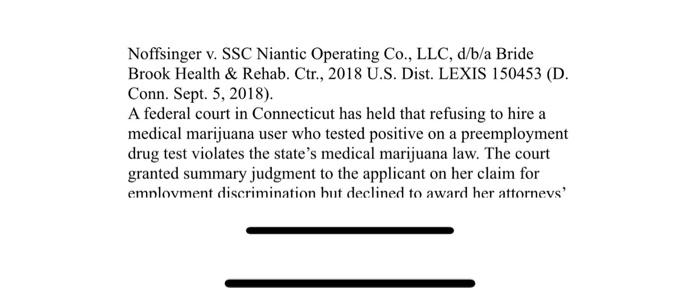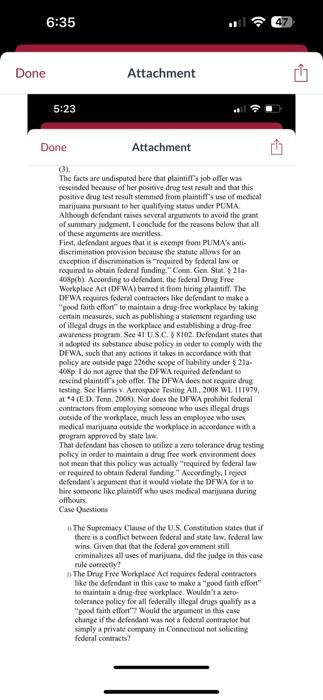Noffsinger v. SSC Niantic Operating Co., LLC, d/b/a Bride Brook Health \& Rehab. Ctr., 2018 U.S. Dist. LEXIS 150453 (D. Conn. Sept. 5, 2018). A federal court in Connecticut has held that refusing to hire a medical marijuana user who tested positive on a preemployment drug test violates the state's medical marijuana law. The court granted summary judgment to the applicant on her claim for emnlovment discrimination hut declined to award her attornevs' (3). The facts are undisputed here that plaintiff's job offer was rescinded because of her positive drug test resalt and that this peritive drug test result stemmed from plaintiffs ase of medical marijuana pursant to her qualifying statas waler PCMA. Although defendant taives several argurients to avoid the grant of summary jodement, I conclude for the reasoes below that all of these arguments are eneritless. First, deferdant atgues that it is exempt from PUMA's antidiserimination prowision because the statute allows for an exception if discrimination is "required by foderal law or reguired to obtain federal funding. "Ccen. Gen. Stat. 82 lav 405 (b) Aesording to defendant, the federal Drug Free Workplase Act (DFWA) bareed in from hiring plaintiff. The DFWA requires federal eontraclors like defendant to make a "good faith effort" to maintain a drug free workplace by taking certain measures; such as publishing a staderment regarding use of illegal drugs in the workplace and establishing a drug free awareness progran, Sec 41 U.S.C. 8102. Defendant states that it adopted its substance abuse policy in ceder to comply with the DFWA, such that any actions it takes in accordance with that policy are outside page 226 the scope of liability under 252la 40sp. I do not agree that the DFWA required defendant to rescied plaintiff job offer. The DFWA does eoc require drug lesting Sce Harris v. Aerospuee Testing All., 2008 WL 111979, at *4 (E.D. Tenn. 200s). Nor does the DEWA prohibit federal contractors from employing soencone who uses illegal drugs cusside of the workplace, much less an employee who uses medical marjuasa ouside the workplace in accordance nith a sogram approved by sate law: That deferdiant has chosen to utilize a zero folerance drug testing policy in onder to maintain a drug free work environment does sot mean that this policy was actually "required by federal law er required to obvain federal fueditis " Aecoedingly, I reject defendan's argument that it would violate the DFWA for is to hire someone like plaintiff who uses medical marijuana during ofthouirs. Case Questions 11 The Supremacy Clause of the U.S. Coestitution seates that if there is a conflict between fiederal and state law, foderal law wins. Given that that the federal govemment still criminalizes all wass of marijuana, did the judge in this case rule correctly? 7. The Drug Frec Workplace Aa requires federal contration like the defendant in this case to make a "good faith effort" to maintain a drug. free workplace. Wouldn't a aerotolerance policy for all federally illegal drugs qualify as a "good faith effoet"? Would the argament in this case change if the defealant was not a federal contractor ber simply a privats cenpany in Connesticut not soliciting foderal coetracts








